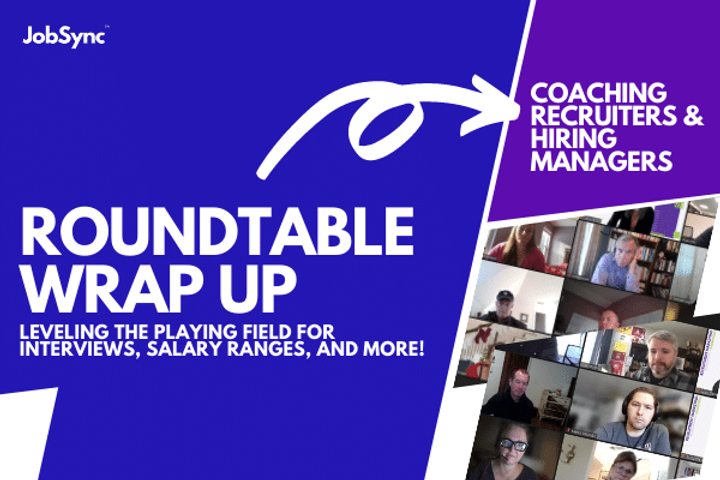
Jo Weech, Founder and Principal, Exemplary Consultants, joined us this month to talk about coaching and the rather controversial topic of coaching candidates through interviews and through salary negotiations. The mute buttons were off, the cameras were on, and we got a great list of walk-aways that any company can implement tomorrow.
To understand Jo, you must first understand how she sees her position, and it is as servants to our employees, recruiters, candidates, and organizations. Inherent in that is her view of what her job is not. Jo’s job is not to get candidates at the lowest cost possible. Her job is not to ‘sell’ a company vision that isn’t real. Her job is not to start a candidate off as an employee who will be disgruntled within weeks or months of joining an organization.
Jo doesn’t believe that you don’t have time to do good coaching, it’s not a choice, it’s a must-do in order for your business to survive and thrive in this highly competitive candidate market.
With that point of view in mind, here are the top 5 juicy tidbits that came out of our roundtable.
Tips for Coaching Hiring Managers
1. Establish the questions your hiring managers plan to ask upfront. Before they have interviews go through them and help them to understand which are good questions to ask and which are not. This isn’t just about what questions are legal, but what are our best practices.
Key tip – Getting hiring managers to sit through hour-long interview training is minimally impactful – but on-the-job training as they need to interview will give you the best chance to coach with real-life examples.
2. Understand what qualified looks like. We need to move hiring managers away from requirements that may not matter and educate them on transferable skills. In a market where the number of candidates available is drastically less than the jobs available, hiring creatively for potential fit rather than skills match will both give hiring managers access to new candidates with different skills and backgrounds as well present candidates with new types of opportunities. Coaching hiring managers to focus less on years of experience and more on the ability to learn and accomplish will allow you to walk away from someone with ten years of experience to learn something that someone else has mastered in two.
Key tip – Train your hiring managers that the term ‘qualified’ is evolving from a checkbox of skills and experiences to a fluid list of capabilities and learning styles.
Tips for Coaching Recruiters
3. Salary requirements first. Share the range and get agreement from the beginning of what the candidate expects. Make sure that what the candidate wants/needs to say yes is within your ability to offer it. Candidates that are well above the range, should not be pursued. Don’t offer your hiring manager a candidate they cannot afford. Similarly, don’t waste the candidate’s time for a job you can’t offer them. Once established, salary cannot be ignored until the offer, check back in at least once before the final interview to ensure that new information hasn’t been added to the mix (a raise/promotion at the current employer, another offer, etc.).
Key tip – avoiding the salary conversation is tantamount to failure. Recruiters can’t fear the salary conversation. Making it part of your process ensures consistency and good outcomes.
4. Coach your candidates (not just your hiring managers). It’s irresponsible to not coach your candidates. As a recruiter, you are a professional people evaluator – your hiring managers are not, and so you coach them. But your candidates are not professional interviewers, either. The days of throwing candidates into the deep end of the pool and letting the “best rise to the top” is actually an exercise in allowing the best-coached candidates to rise to the top. Everyone gets interview coaching, but that coaching isn’t all equal. Parents, peers, siblings, and professional coaches are all “helping” your candidates on how to interview, but that help isn’t consistent and often leads to non-diverse candidates who have the advantages of how to interview.
Key tip: Coach your candidates on who they will be meeting with and what parts of their experience will help that interviewer see their potential.
Top Tip for Coaching Candidates
5. Help reduce candidate anxiety. So much of the poor interview performance is a result of heightened anxiety on the part of the candidate. For many candidates, prepping them with the kind of questions that might be asked, the experiences to focus on, and the personality type of the interviewer can help ease the stress of the hiring process. With good preparation, candidates can remove much of the nervousness and let the interviewer see the key skills and capabilities that will make them a great hire.
Key tip: Reduce candidate anxiety through preparation for each interview.
As recruiting leaders, we have to instill coaching at all steps of the recruiting process to accomplish our key task: hiring top talent that stays and makes a demonstrable difference.
Happy Sourcing!

